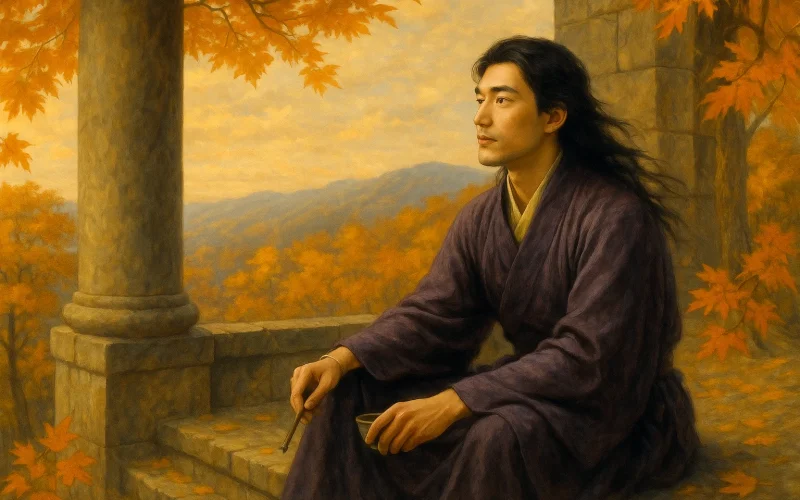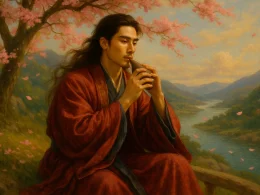Zhang Ji (c. 767 - c. 830), courtesy name Wenchang, was a prominent Mid-Tang poet who originally hailed from Wu Commandery (present-day Suzhou, Jiangsu) before relocating to Wujiang, Hezhou (modern Hexian County, Anhui). He styled himself "Hermit of Jiangnan." Born into humble circumstances, he devoted himself to studies from childhood, mastering classics and histories while excelling in poetry and rhapsody. During the Zhenyuan era (785-805), he traveled to the capital for imperial examinations but initially struggled in officialdom, remaining long in low-ranking positions. It wasn't until the Yuanhe era (post-806) that he gained recommendation for court service, successively holding positions as Investigating Censor, Erudite of the National Academy, Erudite of the Court of Imperial Sacrifices, and Secretary in the Ministry of Personnel. Known for his integrity and outspokenness, he conducted fact-finding visits to local government offices to understand commoners' hardships. His literary works predominantly drew from real-life observations, focusing on societal suffering with critical insight.
Major Works
Life Overview
Born into poverty, Zhang Ji displayed exceptional intellectual promise early on, immersing himself in classics, legal codes, and literature. Around 785 (Zhenyuan era), he journeyed to Chang'an to take the imperial exams but faced prolonged career stagnation in minor posts. His fortunes improved after 806 (Yuanhe era) when influential figures like Quan Deyu recommended him for court service. He rose through roles such as Investigating Censor and Erudite of the National Academy, eventually becoming a Secretary in the Ministry of Personnel. He died around 830.
As an official, Zhang Ji was celebrated for his incorruptibility and moral courage. His tenure in regional government exposed him to grassroots suffering, which became a cornerstone of his poetic themes. Against the backdrop of Mid-Tang political turmoil and social strife, he championed "speaking for the people" (为民立言), using poetry to voice sympathy for the oppressed and critique systemic injustices.
In his later years, he retreated to a reclusive life in the mountains, devoting himself to writing. His style mellowed into tranquil reflection, celebrating nature’s solace. His literary legacy lies in steering Tang poetry toward social realism, cementing its role as a vehicle for civic responsibility. This not only expanded the thematic scope of Tang verse but also established realism as a dominant Mid-Tang tradition, paving the way for future poets.
Literary Style
A leading figure of Mid-Tang realist poetry, Zhang Ji was known for his unadorned diction, social engagement, and emotional authenticity. He excelled in "New Yuefu" (新乐府), a revitalized ballad form, and was paired with Bai Juyi as the "Zhang-Bai" duo, twin pillars of the New Yuefu Movement. This reform advocated "writing for the times, composing verse for real events" (文章合为时而著,歌诗合为事而作), prioritizing social relevance over ornamental flourish.
Key Features of His Poetry
- Accessible Language: Avoided obscure allusions, favoring vernacular clarity.
- Socially Conscious Themes: Focused on taxes, conscription, war, forced labor, women’s plight, and commoners’ struggles.
- Precise Structure & Rhythm: Mastered both five- and seven-character Yuefu forms with natural cadence.
- Blend of Lyricism & Critique: Balanced poignant depictions of suffering with biting indictments of oppression.
- Late-Life Serenity: Shifted toward meditative quietude in retirement, though never abandoning social concern.
Literary Legacy
With Bai Juyi, Zhang Ji spearheaded the New Yuefu Movement, a watershed in Mid-Tang poetics. By yanking verse from aristocratic salons into the grit of everyday life, he infused it with social critique and humanitarian urgency. His contributions include:
- Enduring Influence: Song scholars praised his "unpretentious style"; Ming-Qing educators canonized his works for their "governance in literature, righteousness in verse" (文中有政,词中有义).
- Exemplifying New Yuefu Ideals: Bai Juyi lauded his "mastery of ancient Yuefu," aligning with their shared "satirical poetry" ethos.
- Advancing Realism: Bridged the Classic of Poetry (诗经) and Han Yuefu traditions, mainstreaming folk empathy.









